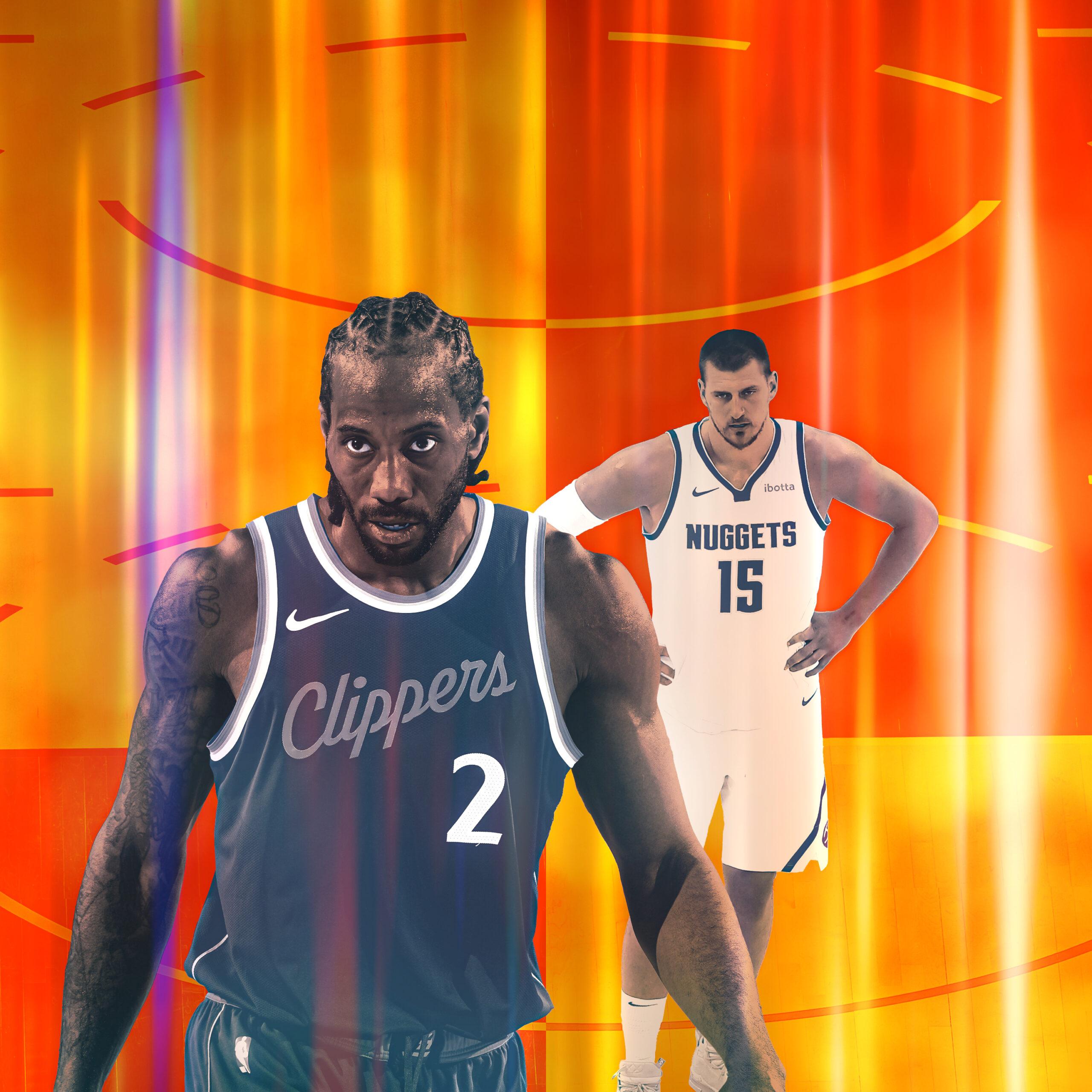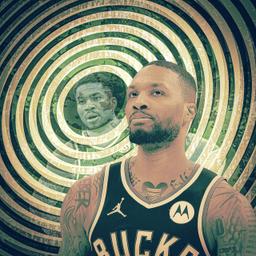
There are great playoff series, and then there is Nuggets-Clippers, the only matchup thus far in the 2025 postseason to be knotted at 2-2—a series perched on the edge of a black hole, so precise in its precarious position in the cosmos that it leaves you questioning the very nature of time.
There are universal markers of time in the NBA: A game has 48 minutes in regulation, five minutes in overtime periods, and 24 seconds per possession. There are also very specific legislated constraints. According to the Trent Tucker rule, first enacted in 1990, a player cannot gain control of a ball on an inbounds pass and legally shoot the ball in a normal motion with less than three-tenths of a second remaining on the game clock; anything less than 0.3 seconds would necessitate either a tap-in or a dunk. Players have bumped up against the very contours of the rule, none more famously than Derek Fisher in his game-winning catch-and-shoot buzzer-beater with 0.4 seconds remaining in Game 5 of the 2004 Western Conference semifinal matchup between the Lakers and Spurs. The Clippers, of course, know a thing or two about being on the losing end of a game-winning alley-oop in the postseason. In 2021, the Clippers lost Game 2 of the Western Conference finals to a Deandre Ayton baseline alley-oop made with 0.9 seconds remaining—the dunk itself somehow took just 0.2 seconds off the clock.
Of course, these plays were made coming off a dead ball, giving teams a fixed amount of time that clearly presents the window of possibility. What we witnessed on Saturday, in literally the final second of Game 4 between the Nuggets and Clippers, was different, astonishing to a completely different degree, infinitesimal in its likelihood. In the last gasps of regulation, Nikola Jokic dribbles out the clock before setting up his trademark Sombor Shuffle from the wing, just inside the arc, over both Ivica Zubac and Kawhi Leonard—1.6 seconds. All eyes are on Jokic, the best player in the world, in a moment that must have given Anthony Davis violent flashbacks. As the ball hangs in the air, even the Clippers could only gaze upon Jokic’s works. With everyone’s back turned, Aaron Gordon cat-burglar prowls along the sidelines, loading up—1.2 seconds—to explode from the dunker spot. Gordon’s feet leave the ground—0.5 seconds—and the rest is a dilation of time that just barely crosses into the boundaries of human perception.
Jokic’s fallaway, by his own admission, sucked. A terrible fling—but the best lobs are exactly that. Gordon’s timing was immaculate, the dunk forever immortalized. His fingertips break contact with the ball with deciseconds, centiseconds, milliseconds to spare. A dunk at the bleeding edge of 48 minutes. A literal all-time play. “It has to be out of his hand when that red light is on. That’s what we’re looking for,” the referee Zach Zarba explained to reporters after the game. “It’s not the cylinder of the rim—it’s whether it’s in contact with his hand or not when that red light comes on.”
Gordon’s entire economy of motion in the moment was executed against the speed of light. You’ve seen it a hundred times. Why not once more?
In a series that’s now tied at two games apiece, in a game so impossibly calibrated, so divinely symmetrical—where just about every counting stat for each team mirrored the other’s almost exactly—the victor was decided on a miraculous accident. It’s the only game-winning, buzzer-beating alley-oop in NBA postseason history. “If the shot hits the rim, it’s a different situation. [Jokic] shot an airball,” Clippers coach Tyronn Lue said on Monday. “Perfect airball.”
In the afterglow of such improbability, it’s natural to fixate on what could have been, to mourn the loss of potential futures. Three of the four games in this series have been decided by three points or fewer. The Clippers could easily be 3-1 right now, as could the Nuggets. It’s the fans’ will and right to lament, but the players themselves seem galvanized by the heightened competition. “Sometimes basketball can be amazing, and it can be cruel as well,” Clippers forward Nic Batum told reporters on Monday. “We got to move on. It’s 2-2. We’re right where we’re supposed to be, both teams.”
The spirit of competition has been alive and well in these playoffs. There have been skirmishes in just about every game. Tensions rise, tempers flare, words provoke, fists are balled. But despite the disruptions to play, it’s been a joy to witness just how much this matters to the players on the court. As these scuffles increase in frequency, it’s become easier to appreciate these moments of rupture for what they are: adrenaline farming—and all the focus, energy, and clarity that come with it. It’s a jolt to the system that hasn’t (yet) led to any damaging repercussions. In fact, in the chaos theory of it all, we couldn’t have witnessed one of the most stunning plays in NBA playoff history if it weren’t for Zubac restraining Gordon from putting hands on James Harden in Game 4, allowing Gordon to avoid a probable ejection and keeping the course of history on track.
We’ve been conditioned to believe the postseason is inherently destructive by centuries of treating sport as a thinly veiled metaphor for human conflict. The zero-sum playoff structure requires both resilience and attrition. One of the central tensions of playoff basketball is balancing the weight of moments against long-term trend lines. Nuggets-Clippers is the only series that does not yet hold the weight of imminent elimination and the uncertainty of the offseason hanging over it. The Nuggets won Game 4 in immortal fashion, but Denver has an uphill battle against attrition. Michael Porter Jr. played valiantly on Saturday despite dealing with two nagging injuries; Russell Westbrook, both the savior and scourge of the Nuggets’ Game 1 victory, has been dealing with left foot inflammation that no one seems to know the severity of. Denver has fewer buttons to push with fewer viable personnel to push them. What they do have is the best player in the universe and championship continuity in their core—the only thing missing from this series on the Nuggets’ postseason bingo card is a torrential Jamal Murray scoring spree. The mere presence of Jokic counts for a lot, although increasingly less so.
The future favors the Clippers despite everything the past half century has told us. Los Angeles has dictated the matchups on defense in this series, going as far as incorporating a strange zone, further clouding Denver’s judgment in moments of fatigue down the stretch. Being able to trust Zubac to guard Jokic one-on-one for the bulk of possessions has opened up new dimensions, too. Kawhi has been deployed as an omni-helper, slipping in and out of Jokic’s periphery to double the big man out of nowhere. His all-killer-no-filler blend of length, strength, balance, and coordination made him one of the greatest on-ball defensive stoppers in NBA history. Now, in his older age, he looms as a long shadow—a spectral presence that is never quite out of range. For the first time in a long, long time, the Clippers have a completely clean injury report in a pivotal postseason game. This is the team’s best opportunity to avenge its crushing loss from five years ago at the hands of these Nuggets. This is the latest and greatest chance to make good on what has been a star-crossed Kawhi era.
For all the effort and adaptation, the winner of the series will be rewarded with the opportunity to face one of the greatest regular-season teams of all time. Intrigue awaits, either way. A Thunder-Clippers series would close the circle on the Paul George trade that continues to reverberate more than a half decade later; the Clippers would face Shai Gilgeous-Alexander at the height of his powers, a far cry from the player they once brought into this league. A Thunder-Nuggets series would close a different circle—perhaps giving the fans in Oklahoma City a strange vision of reality they never hoped to see: Russell Westbrook, raging like hell against the Thunder on his quest for his first ring.
But there’s no point in dwelling on the past or musing too long about the future. In a matchup like this, there’s a sense that the best of this first-round series is about to happen. The best playoff series are generative. They can create a sense of optimism within an arc of struggle. The procession of games presents a problem-solving back-and-forth that elevates the state of play into a collaborative art form. There is a beauty to that notion that the series’ tentpole stars aren’t shying away from. “If you're a basketball fan,” Jokic said after Game 4, “I think this is the best basketball you can watch.” This is what players play for; this is why we tune in.




